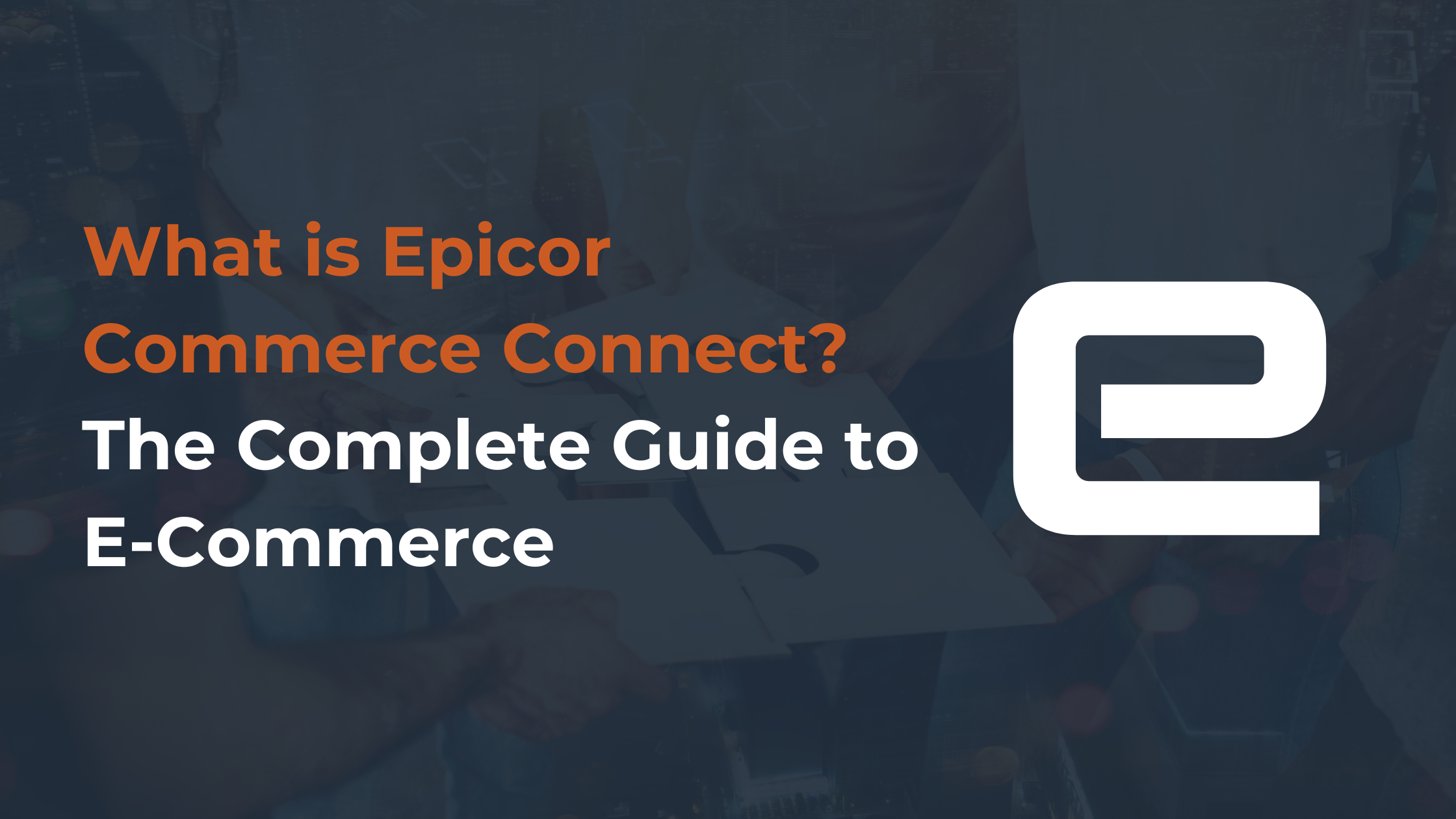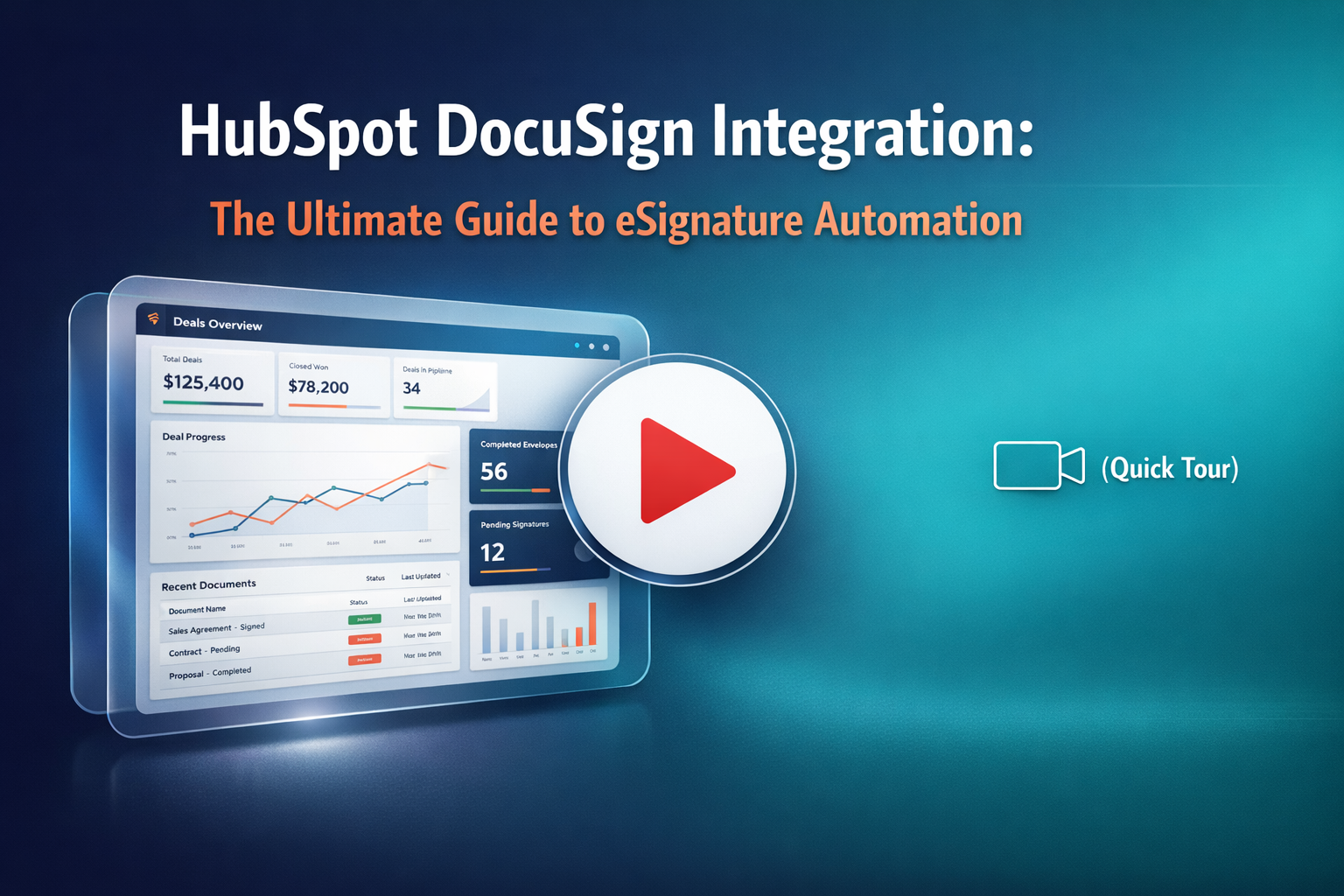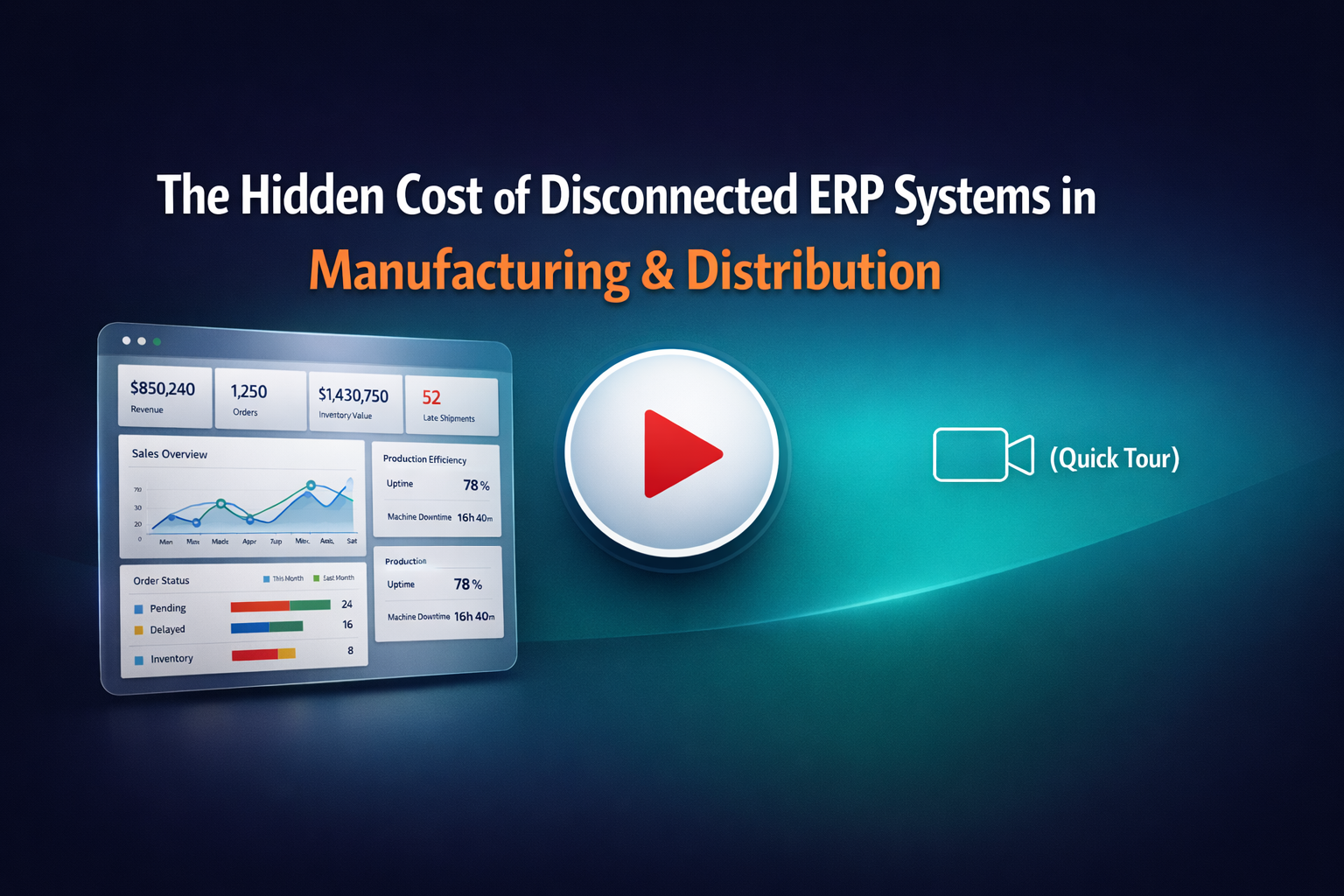Table of Content
What Is Epicor Commerce Connect (ECC)?
.png?width=1200&height=627&name=Integrate%204%20(3).png)
Epicor Commerce Connect (ECC) is a fully integrated eCommerce solution tailored for businesses using the Epicor ERP system. Designed for manufacturers, distributors, and retailers, ECC bridges the gap between a company’s ERP and its online storefront. By synchronizing essential data, such as product details, customer accounts, inventory levels, pricing, and order information, ECC ensures consistency and real-time accuracy across platforms.
ECC offers a robust set of features that support both B2B and B2C eCommerce models. Customers benefit from a self-service portal that allows them to manage quotes, view their order history, track shipments, and access invoices. The platform supports advanced catalog management, enabling businesses to maintain product data directly through the ERP. ECC also features responsive, mobile-friendly storefronts, integration with popular payment gateways, and automated tax calculations, making the online buying experience seamless and professional.
Core Benefits of ECC for eCommerce
What is Epicor used for? Epicor Commerce Connect (ECC) delivers significant advantages to businesses looking to expand or optimize their online sales channels. Here are the main benefits.
Efficiency Through Real-Time Integration
By connecting your eCommerce storefront directly to your ERP and supply chain systems, ECC helps streamline operations from end to end. Inventory levels, order statuses, and shipping updates are synchronized automatically. The result is a faster, leaner order fulfillment process.
Scalable and Flexible Architecture
ECC is engineered to scale as your business grows. With robust integrations and wide platform compatibility, your team can manage complex workflows without extra overhead. Whether you're adding new channels or adapting to shifting market demands, ECC is built to evolve with you.
Boost Customer Satisfaction
With powerful self-service tools, ECC helps you build stronger relationships with customers and suppliers. Features like real-time order tracking, faster delivery processing, and streamlined returns management translate into better experiences and more repeat business.
Live Inventory Visibility
Customers can see real-time stock availability and make informed decisions based on accurate, up-to-the-minute data. This transparency builds trust and helps manage expectations, especially in high-demand scenarios.
Actionable eCommerce Analytics
ECC includes built-in reporting tools that surface key insights on customer behavior, sales trends, and inventory performance. These metrics help drive smarter decisions and align online sales strategies with overall business goals.
Omnichannel Reach
Whether your buyers find you via your eCommerce website, social media, or mobile devices, ECC helps you meet them where they are. It offers a diverse set of digital sales channels, enhancing visibility and generating new revenue opportunities.
Tailored to Your Business
ECC is highly customizable, letting you create unique pricing structures, targeted promotions, and tailored product catalogs. Personalization is easy to implement, ensuring each customer segment gets the right message and the right offer.
Mobile-Ready by Design
Your storefront automatically adjusts to any screen size, offering a consistent and optimized experience across desktops, tablets, and smartphones. Customers can browse, buy, and manage their accounts wherever they are.
Empower Customers with Self-Service
Enable buyers to handle tasks like checking order status, accessing past invoices, or reviewing quotes, without needing to contact support. Self-service tools lower service costs while boosting client convenience.
What e-commerce platforms does Epicor support?
Epicor Commerce Connect is built to work seamlessly with Magento (Adobe Commerce), a leading open-source eCommerce solution. By using Magento as the front-end and integrating it with Epicor ERP on the back-end, ECC offers a powerful, flexible solution for businesses that want to create a dynamic and scalable online presence. Magento’s customization capabilities, combined with ECC’s ERP-driven automation, allow companies to deliver tailored customer experiences while maintaining control over business processes.
While Magento is the primary platform supported by ECC, businesses may explore third-party integrations or Epicor's broader ecosystem for connecting with other eCommerce platforms. However, Epicor promotes and officially supports Magento as the best eCommerce front-end in terms of efficiency, feature compatibility, and native integration.
What are the issues with Epicor Commerce Connect?

While Epicor Commerce Connect (ECC) offers significant benefits for businesses seeking to integrate their ERP with eCommerce, it also presents several challenges that are crucial to consider.
Limited Platform Flexibility
ECC is designed for seamless integration with Magento (Adobe Commerce). If your business uses or plans to switch to another platform (e.g., Shopify, BigCommerce, WooCommerce), integration becomes significantly more complex and may require custom development or third-party tools.
Customization Challenges
While ECC and Magento offer flexibility, customizing beyond standard features, such as advanced pricing logic, unique workflows, or personalized user experience (UX), often requires extensive coding and developer expertise, thereby increasing time and costs.
Steep Learning Curve
ECC’s setup and ongoing management often require a deep understanding of both Epicor ERP and Magento environments. This can overwhelm in-house teams without dedicated technical resources.
How do you choose the right ecommerce Epicor Integration?
Start by identifying the core functionality your business needs, such as real-time inventory sync, customer-specific pricing, order tracking, and multi-channel support. From there, evaluate how well different integration options (like third-party connectors or custom APIs) support those requirements. You should also consider platform flexibility, especially if you're using or plan to use eCommerce platforms outside of Magento. Performance, scalability, and ease of customization are also critical because your integration should be able to evolve with your business.
Another important factor is the total cost of ownership, including licensing, implementation, ongoing support, and upgrade maintenance. Some solutions may appear more affordable upfront, but they require significant investment in development or third-party support over time. Finally, look at the partner ecosystem. Working with an experienced integration provider like SyncMatters can ensure a smoother rollout, faster ROI, and long-term success.
Top Ways to Integrate ECC

Whether you're aiming for a basic sync or a highly customized commerce experience, here are the top ways businesses can integrate Epicor eCommerce for optimal performance and growth:
1. Native ECC + Magento Integration
The most direct and fully supported method is using ECC’s native integration with Magento (Adobe Commerce). This approach leverages ECC’s built-in connectors to sync product data, inventory, customer accounts, orders, and pricing between Magento and Epicor ERP in real time. It’s ideal for companies using Magento as their primary storefront and looking for a deep, bi-directional connection with minimal third-party involvement.
2. Custom API-Based Integrations
For businesses with unique workflows or those using alternative e-commerce platforms, custom API integrations offer maximum flexibility. By leveraging Epicor ERP’s RESTful APIs and Magento’s API endpoints, developers can create tailored integrations that support specialized business rules, third-party systems, or multi-platform operations. This method allows full control over data mapping, sync schedules, and customization, but typically requires more time and technical expertise.
3. Third-Party Middleware or iPaaS Solutions
Using integration platforms like SyncMatters, companies can connect ECC to other eCommerce platforms or extend ECC’s capabilities without heavy coding. Middleware and iPaaS (Integration Platform as a Service) tools help manage data flows between systems, simplify complex integrations, and offer scalability. This is especially useful when you're working with multiple systems (e.g., CRM, PIM, WMS) alongside ECC and Magento.
4. Modular Add-Ons and Extensions
For businesses using Magento as the front end, ECC can be enhanced with Magento modules and Epicor add-ons that extend functionality, such as advanced B2B features, subscription billing, or AI-powered product recommendations. These modular tools can be integrated directly within the ECC environment and often require little development.
What are possible Use cases of Epicor Commerce Connect?
The flexibility of Epicor Commerce Connect makes it suitable for a wide range of industries and use cases. Here are some of the most common scenarios where ECC delivers strong business value:
B2B eCommerce Portal for Manufacturers and Distributors
Manufacturers and distributors can use ECC to launch a self-service B2B portal where customers can view real-time inventory, request quotes, access pricing based on customer tier, and place repeat or bulk orders. ECC syncs data directly from Epicor ERP, ensuring accuracy in stock levels, pricing, and order history automatically.
Online Storefront
Epicor Commerce Connect empowers businesses to build and manage custom eCommerce websites with full control over their digital storefront. From curating product catalogs to syncing real-time inventory, processing orders, and handling shipping logistics, ECC ensures a fully integrated and efficient online retail operation tied directly to Epicor ERP.
Unified Omnichannel Selling
With ECC, companies can deliver a consistent shopping experience across physical and digital channels. Features like buy-online-pick-up-in-store (BOPIS), ship-from-store, and centralized order fulfillment allow businesses to blend online convenience with in-store flexibility — all synced in real time with their ERP system.
Personalized Customer Engagement
Epicor Commerce Connect enables companies to deliver more personalized shopping experiences by leveraging ERP and web data to tailor offers, suggest relevant products, and segment promotions. Customer behavior insights and analytics enable data-driven decision-making, boosting engagement and conversion rates.
Dealer or Reseller Portal
For companies managing a network of dealers or resellers, ECC can support a gated online portal with role-based access. Users can log in to view distributor-specific pricing, order in bulk, check fulfillment timelines, and track shipments without needing to call customer service or submit manual forms.
Epicor ECC vs. Traditional eCommerce Platforms
When comparing Epicor Commerce Connect (ECC) to traditional eCommerce platforms like Shopify, BigCommerce, or WooCommerce, the key difference lies in how deeply ECC integrates with enterprise resource planning (ERP) systems. ECC is purpose-built to work natively with Epicor ERP, making it the ideal solution for businesses that require real-time synchronization of inventory, customer data, pricing, and order processing within a single unified system.
Traditional eCommerce platforms, on the other hand, are often designed with front-end flexibility and ease of use in mind. They offer a wide range of themes, plug-ins, and marketing tools, making them great for companies focused on D2C sales, brand building, or rapid online growth. However, these platforms typically require middleware or custom development to connect with ERP systems.
Ultimately, Epicor eCommerce is ideal for B2B organizations and manufacturers that prioritize operational control, back-end automation, and deep ERP alignment, whereas traditional platforms may be better suited for retailers seeking fast deployment, broad customization, and a strong focus on customer experience.
Conclusion: Is Epicor Commerce Connect Right for Your Business?

So, what is Epicor ECC? Epicor Commerce Connect (ECC) is a powerful solution for businesses already running on Epicor ERP that want to streamline their eCommerce operations. It’s designed for companies that require real-time integration between their front-end web store and back-end ERP — ideal for manufacturers, distributors, and B2B sellers who need accurate inventory, pricing, and order data across channels. If your business prioritizes operational efficiency, complex B2B workflows, or multi-channel selling tied closely to ERP logic, Epicor web commerce can be a smart investment.
However, ECC may not be the best fit for every use case, especially if you need a platform with heavy front-end flexibility, consumer-focused marketing features, or compatibility with non-Magento storefronts. That’s where a trusted integration partner becomes essential. SyncMatters helps you integrate Epicor with different platforms that align with your business goals. Contact us to learn more!
FAQs
Is Epicor ECC Suitable for Small Businesses?
What is Epicor software used for? ECC is primarily designed for mid-sized to large businesses with complex B2B needs, but it can also be used by smaller companies that are already running Epicor ERP and looking to scale their operations.
What Are the Costs Associated with ECC Implementation?
Costs vary based on your ERP version, Magento setup, customization needs, and integration complexity. Expect licensing, implementation, and possible development fees.
How Does ECC Handle Security and Compliance?
ECC uses secure, ERP-backed infrastructure with role-based access controls, HTTPS, and compliance with data protection standards, especially when paired with Magento’s security features.
What Epicor ERPs can be integrated?
Epicor Commerce Connect supports integration with a range of Epicor ERP systems, including Kinetic, Prophet 21, and Eclipse. Regardless of which Epicor platform you're using, integration can streamline your operations by connecting eCommerce workflows directly to your ERP.
What Epicor-eCommerce Data Can Be Synchronized?
ECC can sync product catalogs, inventory levels, pricing, customer records, orders, shipping details, invoices, and payment status between Epicor ERP and your eCommerce storefront.




